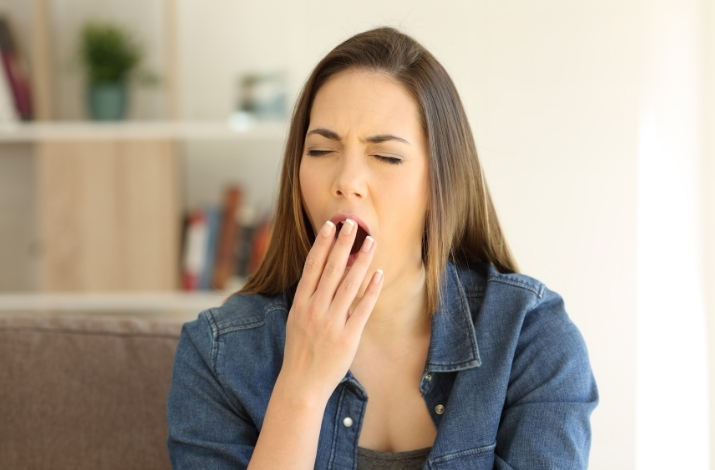The Crash from Carbs

The Carb Crash
Our bodies are metabolic machines that require constant energy to function. However, sometimes we feel like we’re low on energy when in reality we have plenty. And we do have plenty—even a lean person has hundreds of thousands of calories stored as fat. So why is it that so many people feel like they need to eat every two hours? Or feel like they have no energy after just eating? It all depends on how your brain is fueled.
The very term “energy” is vague. When people say they’re “low on energy” they don’t mean this literally, of course. To be actually low on energy is to be genuinely starving—a point where the body has literally run out of fat. Rather, this is what we say when we’re feeling tired or lethargic. Unfortunately, too many people feel this way too often and, interestingly, it might be a result of what they’re eating.
To understand why we sometimes may feel like we have no energy, we need to understand how the brain gets energy, because that’s where this starts. The brain is an energy hog—despite its relatively small size, it has among the highest metabolic rates of any tissue in the body. The brain is unique compared with other body tissues; whereas most tissues rely on a mix of glucose and fat for fuel, the brain doesn’t use fat as a fuel, but rather relies on a metabolite of fat: ketones. In other words, the brain is fueled by glucose and ketones.
Unfortunately, due to dietary habits, most people force the dual-fuel hybrid brain into a single-fuel engine. The frequent consumption of refined starches and sugars ensures the hormone insulin is elevated practically every waking moment of the day. This constant insulin surge prevents the body from burning fat to make ketones. Thus, the absence of ketones means the brain only has access to one of its fuels—glucose. And this is where the problem lies with regards to “energy”; when the brain is forced to rely only on glucose, it’s subject to the highs and lows of glucose throughout the day. Paradoxically, this is often most evident following carbohydrate-heavy meal, and the hormone insulin is often a culprit [1].
When we eat refined starches and sugars (e.g., bread, crackers, sweets, etc.), the rapid rise in blood glucose is matched by a rapid rise in insulin—insulin wants to keep blood glucose from going staying too high. Sometimes, insulin goes too far, leading to a state called “reactive hypoglycemia” [2]. To the rest of the body, this relative drop in glucose is no problem—because it can use fat as a fuel, it works just fine. However, the brain experiences a unique problem due to its unique fuel demands. Not only is the glucose lower than what the brain is used to, but the brain’s other fuel, ketones, are also low. After all, insulin turns off ketone production [3]. This is when the “crash” occurs.
There’s some important nuance here that’s worth discussing, lest anyone think the carb crash and tired brain are merely a result of low glucose. It’s also a matter of what fuel your brain is used to or even dependent on. You see, when a person is constantly spiking insulin by eating refined carbohydrates, the brain has no access to ketones and, thus, is totally dependent on glucose. But if a brain is used to seeing and using ketones, then relatively lower glucose levels are not a problem and the brain keeps working perfectly well [4, 5].
Take-away Thoughts
Training the brain to use ketones as a complementary fuel to glucose isn’t complicated: if you eat glucose, the brain will (or attempt to) use glucose. Thus, either fasting or a low-carbohydrate diet can enhance the brain’s ability to use ketones as a fuel [6]. Interestingly, this same strategy may even improve glucose use in the brain [7]!
References
1 Luyckx, A. S. and Lefebvre, P. J. (1971) Plasma insulin in reactive hypoglycemia. Diabetes. 20, 435-442
2 Brun, J. F., Fedou, C. and Mercier, J. (2000) Postprandial reactive hypoglycemia. Diabetes & metabolism. 26, 337-351
3 Soeters, M. R., Sauerwein, H. P., Faas, L., Smeenge, M., Duran, M., Wanders, R. J., Ruiter, A. F., Ackermans, M. T., Fliers, E., Houten, S. M. and Serlie, M. J. (2009) Effects of insulin on ketogenesis following fasting in lean and obese men. Obesity (Silver Spring). 17, 1326-1331
4 Owen, O. E., Morgan, A. P., Kemp, H. G., Sullivan, J. M., Herrera, M. G. and Cahill, G. F., Jr. (1967) Brain metabolism during fasting. The Journal of clinical investigation. 46, 1589-1595
5 Cahill, G. F., Jr. (2006) Fuel metabolism in starvation. Annual review of nutrition. 26, 1-22
6 Neth, B. J., Mintz, A., Whitlow, C., Jung, Y., Solingapuram Sai, K., Register, T. C., Kellar, D., Lockhart, S. N., Hoscheidt, S., Maldjian, J., Heslegrave, A. J., Blennow, K., Cunnane, S. C., Castellano, C. A., Zetterberg, H. and Craft, S. (2020) Modified ketogenic diet is associated with improved cerebrospinal fluid biomarker profile, cerebral perfusion, and cerebral ketone body uptake in older adults at risk for Alzheimer’s disease: a pilot study. Neurobiol Aging. 86, 54-63
7 Roy, M., Nugent, S., Tremblay-Mercier, J., Tremblay, S., Courchesne-Loyer, A., Beaudoin, J. F., Tremblay, L., Descoteaux, M., Lecomte, R. and Cunnane, S. C. (2012) The ketogenic diet increases brain glucose and ketone uptake in aged rats: a dual tracer PET and volumetric MRI study. Brain research. 1488, 14-23
This article is for informational and educational purposes only. It is not, nor is it intended to be substitute for professional medical advice, diagnosis, or treatment and should never be relied upon for specific medical advice.



















